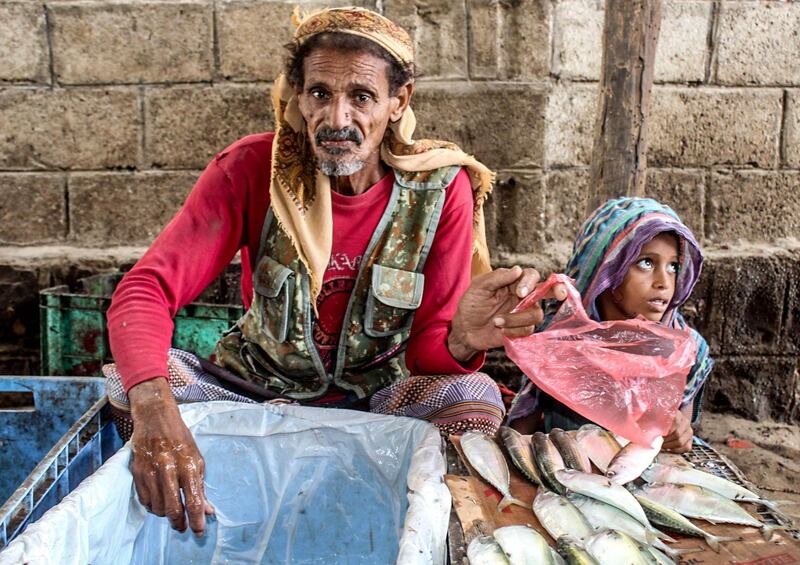Yemen’s marine fish stocks are at risk of exploitation and depletion due to destructive fishing practices that have caused a drop in annual fish production, government officials and experts have warned.
Yemen’s minister of fishery, Fahd Kafayn, told The National that the country’s fish stock is being overexploited by local and foreign fishermen and some kinds of fish have already disappeared from the market.
“The marine fish stock in the country is generally experiencing a hard time,” Mr Kafayn said in an interview on Monday.
Figures released by the government’s Fishery Authority in the south-eastern province of Hadramout and obtained by The National showed that roughly 12,000 fishermen using 3,800 boats caught 42,000 tons of fish in 2018, compared to 52,604 tons in 2012.
Production reached its lowest point in 2016 when the production was 33,034 tons. Officials and experts say the fluctuating figures are indications that the marine stock is suffering overexploitation. “This is an indication to an ecological problem,” the minister said.
When the Houthis seized control of power in late 2014 the country’s coast guard apparatus crumbled as forces deserted their positions, leaving a security vacuum.
During the ensuing war, the country’s seas were left unprotected, allowing foreign vessels and local fishermen to wreak havoc at sea. The impact of arbitrary destructive fishing practices, such as trawling, was dwindling fish production.
“The state’s monitoring on the sea has decreased due to lack of capabilities and the security situation. This allowed foreign vessels to illegally fish in the Yemeni waters,” the minister said, adding that Yemen has seized 43 Iranian ships fishing in the Yemeni waters over the last three years.
As the Saudi-led coalition deployed warships off the Yemeni shores to prevent Houthis from bringing in Iranian arms, foreign vessels have largely disappeared. But experts say the threat to the fish stock came from the Yemeni fishermen.
The most destructive and controversial method used by local fishermen is known as ‘purse seining’. Instead of using a small round net to trap fish, as fishing regulations say, locals use a large net that catches a dozen tons of fish at a time. Since their small boats cannot carry the entire catch, fishermen retrieve a few tons and sail back home leaving behind tons of dead fish.
Sabri Mohammed Lagarb, the director of Hadramout’s Marine Sciences and Biological Research Authority, a government body responsible for making studies on marine life, agrees with the minister that those fishing methods have caused marine biological disorder.
“We have to remember one thing, purse seining is a legitimate method that has long been used. But today’s fishermen violated the size of the net and timing of using this method,” Mr Lagarb told The National. “In the past the nets were very small and the entire process was regulated. No fishing was allowed during reproduction,” he said.
To stop fishermen from harassing marine stock, Mr Lagarb calls for “biological resting” in which all suspected hazardous fishing methods are put on halt for some time to allow fish to reproduce without disruption.
“This biological resting will greatly replenishing the stock,” he said.
Even before the beginning of the war, there has never been a detailed study about the country’s marine fish stock.
Mr Lagarb’s office, which is responsible for making such studies, is poorly equipped and understaffed, he said. “Some kinds of fish have disappeared over the last several years. We are in need of an urgent study to determine the threats facing the stock,” Mr Lagarb said.
Fishermen who practice seine fishing have strongly denied accusations that they are using up the country’s fish stock.
“This is an old practice has been used everywhere for ages. Why would they [fishery officials] ban it here in Mukallah?” Mr Sabri, a fisherman, told The National. “We only catch the fish amassing near the surface.”






